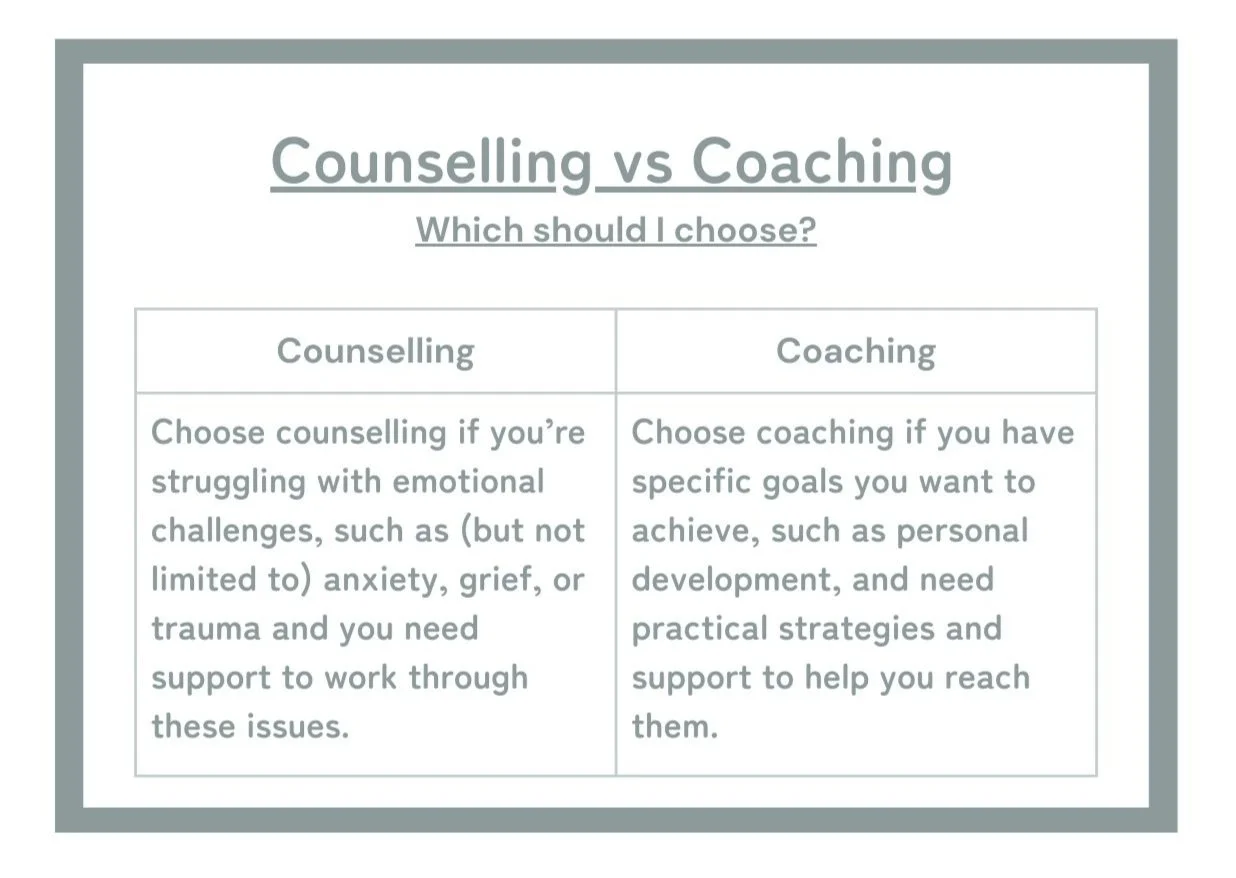What is the difference between counselling and coaching?
Counselling and coaching are two common choices for people looking for support for emotional pain or for personal development. Thus, if you are struggling or feeling stuck, you may be asking which one is better for you and what makes them different.
There are many differences between the two modes of support and also some similarities and overlap. Counselling can contain elements of coaching and Coaching can contain elements of therapeutic work.
You could say on a basic level that at the heart of counselling is solace and at the heart of coaching is change.
But of course, there's more to it than that.
The primary distinction between coaching and counselling is that counsellors are trained to work in depth with mental health concerns such as anxiety, depression, bereavement, past trauma, or other underlying issues and coaches are not.
I’ll go over some of the key distinctions between counselling and coaching in this blog, so you can understand their unique approaches and you can determine which one might be the best fit for you.
Please note that while I believe the single most important and best indicator of whether or not a therapist or coach will be effective in working with you is the strength and quality of the relationship between you both, it’s also vital (in my opinion) to choose a therapist who knows what they’re doing and who has some solid training, so please check that you are working with a competently trained professional.
Counselling (also known as therapy or psychotherapy)
Many of us encounter challenges and difficulties that can impact our mental health and well-being. Counselling offers a confidential and supportive space to explore these challenges, gain insight into your thoughts and feelings, and work towards positive change. It can help you lead a happier and more fulfilling life.
It involves exploring emotions, thoughts, and behaviours in a non-judgmental and confidential setting. Counselling aims to help you gain clarity, resolve personal issues, and develop coping strategies to navigate life's challenges more effectively.
Benefits of Counselling:
Emotional Support: Counselling offers a supportive environment to express and process emotions, helping you feel heard, understood, and validated.
Self-Exploration: Counselling encourages self-reflection and exploration, allowing you to gain insight into your thoughts, feelings, and behaviours.
Coping Strategies: Counselling equips individuals with coping strategies and tools to manage stress, anxiety, depression, and other mental health challenges.
Improved Relationships: Counselling can enhance communication skills, assertiveness, and conflict resolution abilities, leading to healthier and more fulfilling relationships.
Personal Growth: Counselling fosters personal growth, resilience, and empowerment, enabling you to overcome obstacles and achieve your full potential.
Who can benefit from counselling?
Counselling is beneficial for anyone experiencing emotional distress, relationship issues, life transitions, or mental health concerns. It can help you cope with things such as grief, trauma, anxiety, and low self-esteem. Counselling is suitable for people of all ages, backgrounds, and walks of life.
Conclusion:
Counselling is a valuable resource for promoting mental health and well-being, offering support, guidance, and encouragement to you when you are facing difficult situations and/or feelings.
Having a counsellor bear witness to what you are going through can be life-changing.
Coaching
At some point in our lives, many of us need guidance and support to navigate life's challenges and achieve our goals. Coaching provides a structured and empowering process to help you clarify your goals, overcome obstacles, and unlock your full potential.
Coaches use a variety of tools, techniques, and questioning to facilitate self-awareness, goal-setting, and action planning tailored to the individual's needs and objectives. Some coaches may take past experiences into consideration; however, they are usually more focused on what is happening now and what you want to happen in the future.
Coaching is a process where the coach supports you to make a change, learn something new, or achieve your goals.
Coaching usually involves -
Setting goals
Devising plans
Identifying strengths
Locating barriers and challenges
Addressing unhelpful, limiting, or negative thinking
Creating and practicing new habits
Developing Resilience
The overall objective is to help you make progress in a certain area of your life, at work, or to overcome a problem you're struggling with.
Benefits of coaching:
Clarity and Focus: Coaching helps you gain clarity on your values, priorities, and goals, enabling you to focus your energy and efforts on what truly matters to you.
Goal Achievement: Coaching supports you in setting realistic and achievable goals, breaking them down into actionable steps, and staying committed to your pursuit until they are accomplished.
Self-Confidence: Coaching boosts self-confidence and self-belief by recognising and leveraging your strengths, talents, and capabilities.
Accountability: Coaching provides a structure of accountability and support to keep you accountable to your goals, overcome obstacles, and stay on track towards success.
Personal Growth: Coaching fosters personal growth, resilience, and empowerment, empowering you to overcome challenges, embrace change, and achieve your full potential.
Who Can Benefit from Coaching?
Coaching could be beneficial for you if you are seeking personal development, career advancement, life transition support, or improved well-being. It is suitable for people of all ages, backgrounds, and professions who are motivated to make positive changes in their lives and are willing to invest time and effort in their growth and development.
Conclusion:
If you're struggling to make a change or motivate yourself, then coaching can help you define your goals and help you stay accountable.
Unconditional support from a coach can have a positive impact on your health and wellbeing and can help you move from a state of surviving to thriving.


